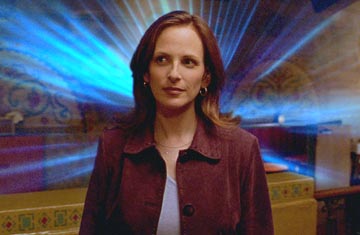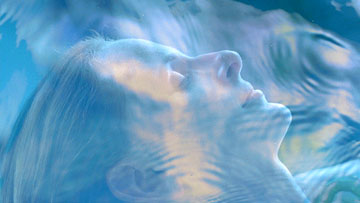What the #$*! Do We Know?


What the #$*! Do We Know? is not a film for those who want to sit back and turn their mind off. What the Bleep, as it is more affectionately known, is a hybrid documentary where there are the standard talking head interviews interspersed with a "story" about a person experiencing much of what the interviewees are talking about. It is a metaphysical trip into the world of quantum mechanics, the brain, religion, philosophy and truth, and how everything ties together. The directors, William Arntz, Betty Chasse, and Mark Vincente, along with writers Arntz, Chasse, and Matthew Hoffman, wanted to combine these elements with visual effect and music to create a sort of head-trip into the a world of self-discovery and truth.
It works to a certain degree. The most annoying element of What the Bleep is the complete lack of identification for the fourteen people interviewed. While it is clear that they are highly educated people who can speak eloquently and rationally convey their point, it is only after the end credits begin rolling that it is clear that most of them are professors who teach physics (with an emphasis on quantum mechanics), neurologists/anesthesiologists/physicians, and a couple mystics. Marlee Matlin (Two Shades of Blue, In Her Defense) plays Amanda, the person who is discovering the truths that these scholars are speaking about. As they talk about various heavy topics, Amanda goes on a journey or spiritual awakening, looking at the world from a new perspective and ultimately gleaning some deeper understanding of herself.
While some of the visual effects are pretty cool, many, especially the melding of animation and live action come off as cheesy. Amanda looks on as little glob-like personifications of emotions dance around her. Nobody else but her can see them. The more interesting things by far are what these scholars are saying. They begin by asking people to look at their perceptions of reality. In the time of Columbus, everybody believed that the earth was flat. Now it's obvious that this is not the case. But this was a basic assumption that everybody got wrong. What about things taken for granted today? Is there something so fundamental that people take its truth for granted that one day science will disprove? How do people know?
Arntz, Chasse, and Vincente essentially want people to ask questions about what they believe in order to gain a better understanding of themselves and the world around them. What exactly is reality? Everything the brain processes is a series of signals. So when it "think" about memories and the same signals resurface, does this make the memory "real?" There is a lot of information given in What the Bleep, and the filmmakers do not slow down in order for people to catch up. The first half, about quantum physics and the brain is easy to understand. When the various scholars begin tackling more abstract issues and touching upon religion, and ultimately the role each person plays in shaping his/her destiny, it begins to sound a little too New Age-y for its own good. However, the fact that it forces the viewer to pay attention and think about what is being said is a good and unusual thing.